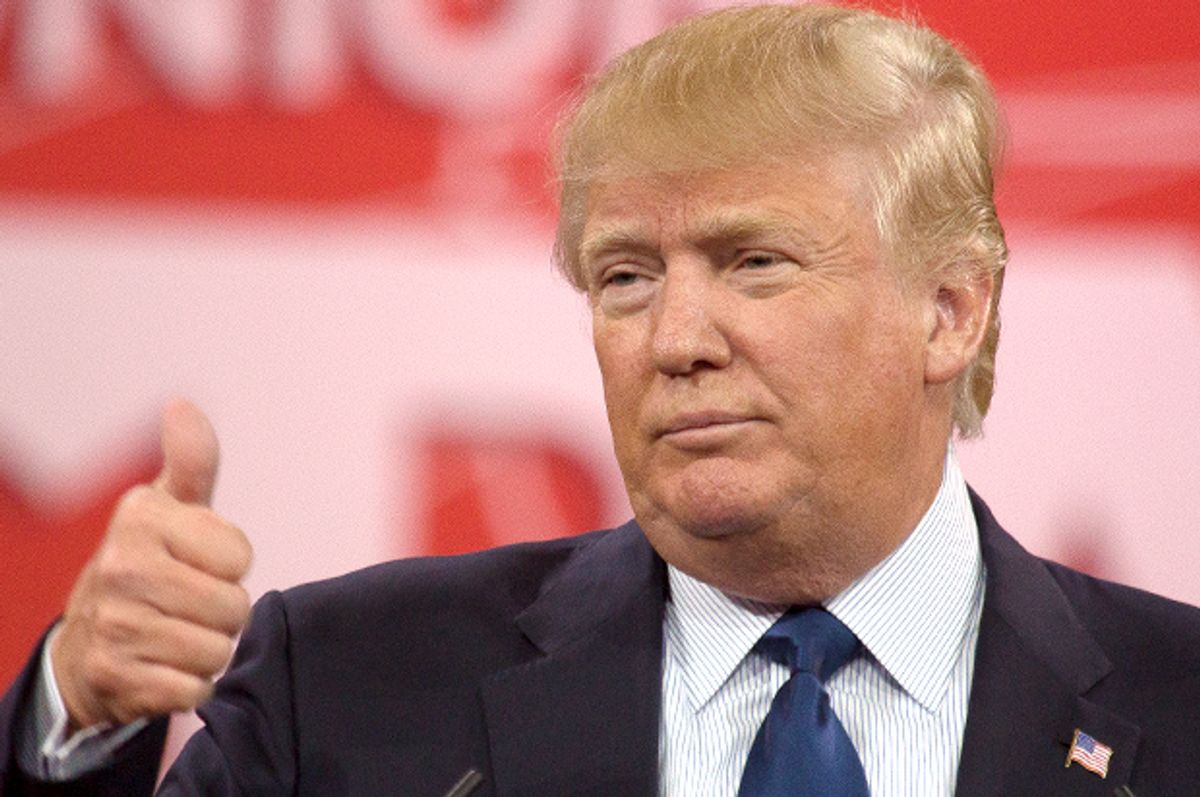Even though I’m not a politician, I guess I committed a textbook Kinsley gaffe on “Hardball” yesterday, when I inadvertently told the truth about what I think of the 12 New Hampshire Republican voters Bloomberg assembled to explain the Donald Trump phenomenon. (You can watch, below.) I said they made me “sad,” and I made a comment about “the lowest common denominator” (more on what I meant in a minute) – and then my friend Michael Steele, the former chair of the Republican National Committee, had a lot of fun calling me an “elitist” and insisting people like me are why voters like that support Trump. Or something.
I happen to think the world of political media is making way too much of what those 12 voters said (especially since some of them have complained that they were manipulated into saying more positive things than they believe about Trump). But watching those voters insist Trump is “one of us,” even though he’s a billionaire; that “he speaks the truth;” that he’ll make the White House “classy” again; well, I made the mistake of expressing my sadness, and yes, my disdain for that point of view.
“They're not thinking. They want to be entertained,” I asserted.
That’s a big mistake in mainstream journalism, where the Very Serious People insist we must respect what Trump’s voters represent. I failed to keep up the Beltway fiction that we must take these voters seriously because they’re “frustrated” with Washington, and thus their irrational anger and weakness for slogans over solutions is a symptom of a grave political malady in The Age of Obama.
But actually listening to those voters, it’s hard to take much they said seriously. Their Trump praise frequently reflects their Obama disdain -- calling a potential Trump White House “classy” is an implicit assertion that the current occupants of the White House aren’t “classy” – and their support of Trump’s “solutions” makes no sense.
Bloomberg quotes “Roger, who works with the elderly,” saying this: “Specifically, he said he'll put a wall on the southern border. When you talk about common sense, that's a common-sense thing to do.”
If Roger thinks erecting a wall on our 2,000-mile southern border with Mexico is “a common-sense thing to do,” I worry a little bit about the elderly he works with.
There’s a childlike wishful thinking in these voters’ belief that Trump can solve all the country’s problems by being “tough.” And that’s what I meant with my reference to the “lowest common denominator” – I actually wasn't referring to the voters themselves (in fact, that makes no sense); I was talking about the solutions they seem to embrace for the country’s woes. Pining for a “tough” guy who’s done well in “business” but is “one of us” is simplistic and a little scary. Most of that New Hampshire focus group seemed to want a daddy, not a president.
Of course Michael Steele had a great time calling me “elitist” after my “gaffe.” That, too, is a Beltway piety that serves to obscure the genuine privilege of political elites. If we genuflect to the great wisdom of the common voter -- especially when he or she rants about a Democrat -- maybe nobody will notice how many of us reside near or in the top 1 percent. Also, as I said, I’m more “one of them” than Trump is – I wasn’t born into wealth.
But Steele put his finger on a dilemma – for his party. When people hear criticism of Trump’s voters, he explained, “whether it's from the media or Republicans in the party, they go, 'This guy,' as the woman said, ‘he's speaking to me. I may not agree with everything he's saying, but he's one of us. He's a billionaire, but he's one of us.’” That’s a genuine problem for Republican elites who disdain Trump but don’t want to see him mount a third party run if he doesn’t get the nomination. But that’s not my problem.
I don’t deny that Trump’s candidacy is for real, and represents a real threat to establishment Republicans -- who know he’d lose a general election, not just to Hillary Clinton but to socialist Bernie Sanders. But that doesn’t mean we should overstate the size of his constituency. In early polls, Trump is winning roughly 20 percent of likely Republican primary voters – a group that makes up less than half of all eligible voters, given the edge Democrats have in party registration.
So something less than 10 percent of eligible American voters currently say they support Donald Trump. That isn’t a mandate; that’s the same old angry, noisy, delusional minority of voters that persistently afflicts American politics. I’m not going to apologize for telling the truth: their support of Trump makes me sad, because their reasoning shows little or no grasp of what it takes to make political change in this country.
Here's the "Hardball" segment. Am I wrong?

Shares